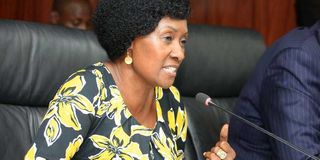Eyes on Nancy Macharia as she begins new term as TSC boss

Teachers Service Commission CEO Nancy Macharia. PHOTO | FILE | NATION MEDIA GROUP
What you need to know:
- Some of her controversial policies include the delocalisation of teachers and career development programme and appraisals.
- The fights also fuelled a division in the Knut leadership, with a faction ousting Mr Sossion and replacing him with his deputy Hesbon Otieno.
In the corridors of the Teachers Service Commission (TSC), Ms Nancy Macharia is known as a no-nonsense administrator who has led the institution with an iron fist in the past five years. And last week, her term was renewed for another five years despite opposition from some NGOs.
As the chief executive, her leadership style has been characterised by confrontation with teachers’ unions and formulation of tough policies, all in efforts to streamline the teaching profession.
Some of her controversial policies include the delocalisation of teachers and career development programme and appraisals, which resulted in bad relations with the teachers’ unions, especially the Kenya National Union of Teachers (Knut).
KNUT-KUPPET WARS
Ms Macharia was also accused of being the force behind the wars between Knut and the Kenya Post Primary Teachers (Kuppet).
In the past two years, Knut and TSC have disagreed on the implementation of career development guidelines, promotion of teachers, rolling out of the new competency-based curriculum, teachers’ delocalisation and the implementation of the 2016- 2021 Collective Bargaining Agreement (CBA).
The wars culminated in several court cases, the withholding of Knut dues by TSC, deregistration of Knut secretary-general Wilson Sossion as a teacher and the recent move by the teachers’ employer to cut links with Knut.
The fights also fuelled a division in the Knut leadership, with a faction ousting Mr Sossion and replacing him with his deputy Hesbon Otieno. A court, however, reinstated Mr Sossion.
The TSC and Knut wars have also seen mass movement of Knut members to Kuppet and the Kenya Women Teachers Association (Kewota).
AGENCY FEES
So far, Kuppet is receiving agency fee from more than 30,000 teachers, a majority of whom were members of Knut.
Kuppet currently has a membership of 79,000 and 31,000 others who have applied to join and are paying the agency fee.
Already, more than 18,000 school heads and deputies are said to have ditched Knut and joined Kuppet. The wars also attracted other unions such as Kenya National Union of Private Teachers, which had applied to change name to Kenya National Union of Private and Basic Education School teachers (Kupbest) to attract primary school teachers. The application was opposed by Knut.
Some 570 special needs education teachers are in court to stop monthly deductions after they were made members of the newly formed Kenya Union of Special Education Teachers (Kusnet), which they say they did not subscribe to.
The teachers are complaining that the employer effected deductions since December last year.
COVID-19 EFFECTS
Ms Macharia’s new term is expected to focus on the effects of Covid-19 on the teaching profession and negotiations on the CBA, which has been a source of conflict between TSC and the teachers’ unions.
Last year, President Uhuru Kenyatta started the process of replacing three commissioners after their tenure ended.
Two commissioners, Mr Mbage Njuguna and Ms Leila Abdi were sworn in last month by Chief Justice David Maraga.
On Thursday, a lobby group filed a case in court opposing the extension of Ms Macharia’s term.
The Midrift Human Rights Network says the TSC did not advertise the position as stipulated in the law.





